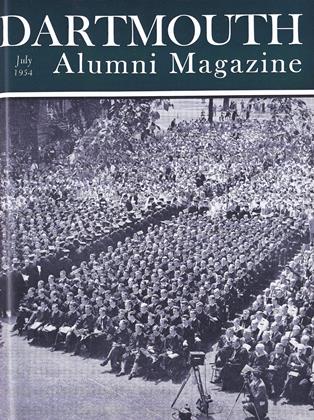MEN OF THE GRADUATING CLASS:
We stand on the threshold of leave-taking. In a seeming sense, the relationship of teacher and student as between Dartmouth and you is at an end. And yet, in a more real sense, the relationship of teacher and student, once truly joined, is never dissolved.
Teaching, we hope you now perceive, is a shared experience; and while - unlike matter - shared experience can by mortals be created, once created it follows the same law and in life cannot be destroyed. From here on you and your teachers are a part of each other and by that fact you, for better or for worse, will have a part in teaching those who follow on behind you here. And, with a hint of a smile, we may remind those who return for their twenty-fifth and fiftieth reunions - it was ever so.
The point is, gentlemen, that in the largest sense your teacher has been Dartmouth, not just a score or so of men, and it is Dartmouth you go forth from today, not just college. For the Class of 1954, as for 1929 and 1904, and all the others, there will be reunions and the joy of returning together as long as there is breath in two of you.
But I speak to you now about another kind of returning. It is that returning to known things from which both men of affairs and of learning have need to take their bearing.
In the years ahead, as in the years behind, you will learn your portion of what there is in life for knowing (and it is not the all of it) by seeking out the meaning, the truth and the beauty of your own experience. For a thing to be learned it must be yours, but to be measured in goodness and fullness it must be more. It is that "more," the hard-earned values of civilization, which is the inheritance of a liberally educated person.
The enjoyment of that inheritance is the work of a lifetime and it needs remembering at this point that four years of college is at best merely one way of being introduced to the work of any lifetime. The liberating arts are neither the monopoly nor a creation of any college; they are the bright beacon lights of humankind's understanding of its journey. Since these beacons have been erected out of human experience, you might reasonably expect the beacons of your time to be higher and brighter than they were for your forebears and so they may be for the truly educated man, but it is also true that today's beacons must guide men who range over expanses of experience and at speeds never heretofore imagined to be within the scope of a lifetime.
That, gentlemen, is why I think it soberly likely that the navigation of your individual journeys may be both more exacting and more exciting than the logs of earlier voyagers might suggest. The ancient shoals of man: insincerity and dishonesty; arrogance and insensitivity; avarice and aggression; fear and scorn of faith; cheapness and the temptation to prostitute any good thing, including even the prosecution of evil - all these will be at best near misses on any voyage you may chart.
May I speak this last word for all who served you here: there is no yonder point in any human venture beyond the reach of Dartmouth's teaching if you will but return to it and have it so.
And now, men of Dartmouth of 1954, as in all the years before, the word is "so long," because in the Dartmouth fellowship there is no parting.
 View Full Issue
View Full Issue
More From This Issue
-
 Feature
FeaturePresident Emeritus Hopkins Is Honored With Dartmouth's First Alumni Award
July 1954 -
 Feature
FeatureRobert S. Oelman '31 Heads Alumni Council for 1954-55
July 1954 -
 Feature
FeatureE. S. French Retires as Life Trustee; Ruml Succeeds Him
July 1954 -
 Feature
FeatureAnother Record for the Fund
July 1954 -
 Class Notes
Class Notes1929's Record-Breaking 25th
July 1954 By CHRISTIAN E. BORN '29, BILL ANDRES, SQUEEK. -
 Article
ArticleThe 1954 Commencement
July 1954 By FRANK PEMBERTON
PRESIDENT JOHN SLOAN DICKEY
-
 Article
ArticleValedictory to 1953
July 1953 By PRESIDENT JOHN SLOAN DICKEY -
 Feature
FeatureWhat the Project Means
MAY 1957 By PRESIDENT JOHN SLOAN DICKEY -
 Article
ArticleThe Mission of Liberal Learning
March 1960 By PRESIDENT JOHN SLOAN DICKEY -
 Feature
FeatureValedictory to 1960
July 1960 By PRESIDENT JOHN SLOAN DICKEY -
 Feature
FeatureValedictory to 1966
JULY 1966 By PRESIDENT JOHN SLOAN DICKEY -
 Feature
FeatureValedictory to 1968
JULY 1968 By PRESIDENT JOHN SLOAN DICKEY







